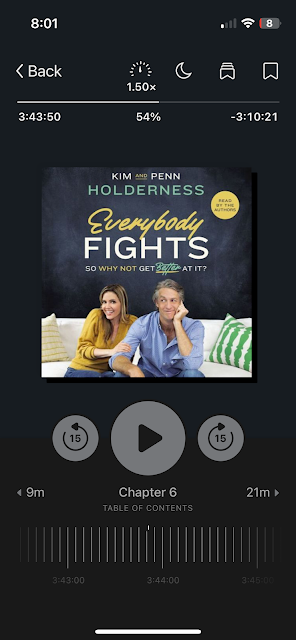There is so much fighting at Casa Biggs. It's mostly between the kids and me with Robin playing the roll as International Peace Observer.
The littles are going to be crushed when she leaves in a couple weeks.
The good news is that all three little Biggs have no problem expressing their emotions or communicating their wants. The bad news - well, it is a lot for my only-child peacemaker husband. I'm exasperated, "why can't you get in the fight?" and he's more, "how do we live in peace?". The truth is, contrary to the title of this book, not everybody fights.
Some, ahem
enneagram nines, just avoid conflicts all together. But, fighting is my love language. (half joking) As an
enneagram eight, if you aren't challenging me - it doesn't really seem like you're in the game. And so, I read this book in an effort to glean some skills for how to get Paul to fight with me in a way that might be more palatable for him.
The book emphasizes some of the classic relationship conflict advice. Wait for everyone to cool down after the fight to discuss. Practice active listening - "this is what I heard you say...". Don't tell anyone to "calm down" - instead kindly acknowledge that "this is hard". There are also more gems disclosed during entertaining audiobook banter. These are the top three take-aways that I'd like to employ with my sparring partners:
1. Treat your partner as you would an (American) stranger.
In Berlin people just give each other questioning stairs. But in the US you make eye contact, greet the person, and maybe even exchange a compliment. I'm often so distracted that I don't do this properly with my people. Also, I've decided after another morning of bleary-eyed stare downs with Berlin strangers, I'm just going to start greeting people on the street.
"Good day fellow Berliner! Yes, my child is asleep in my bike on-top of a bunch of ballon animals."
2. Tell me more - the new magic words
I get frustrated with Paul that he doesn't tell me what he wants. One of the traits of the enneagram nine is they are generally fine with anything. Don't bother asking where they want to go to dinner. As an eight, I should be happy about getting my way. But I'm mostly just confused - how do you really not know what you want? Nevertheless, when Paul does tell me something he wants, I am too quick to shoot it down. Mostly it's because the idea often adds more work for me. However, if I really want to understand what he wants then I need to ask him to "tell me more".
3. Make your 'thank yous' more specific
Many days - as Paul as heading out the door - I say, "Thanks for making the monies." But the book recommends mentioning the specific sacrifice the person made and the benefit to you. So I will add, "I appreciate that you work hard so I can stay home blogging and napping off my oncoming cold." Speaking of which, I need to get on today's second goal. Carmen can't have all the fun.






0 Comments:
Post a Comment
<< Home